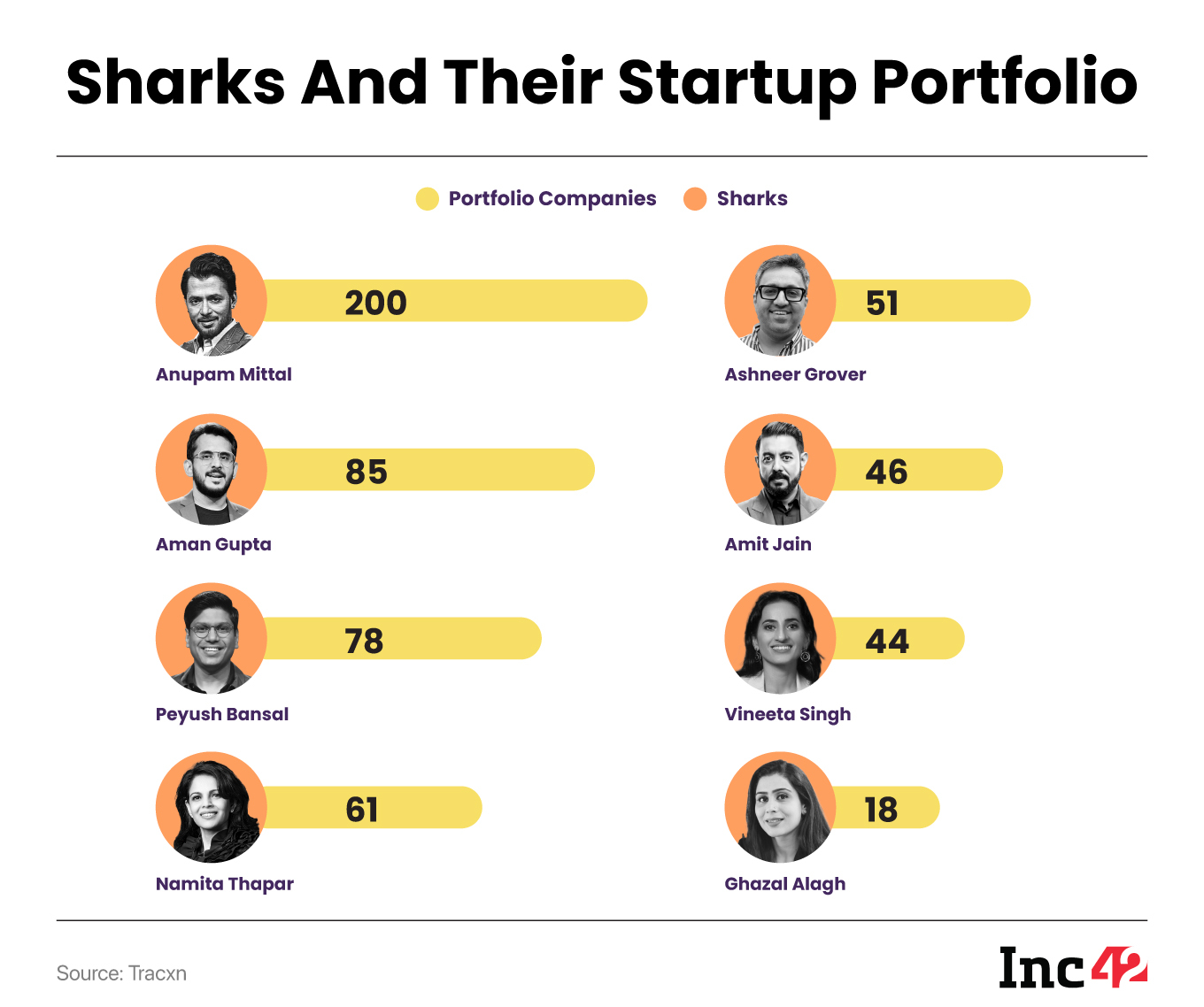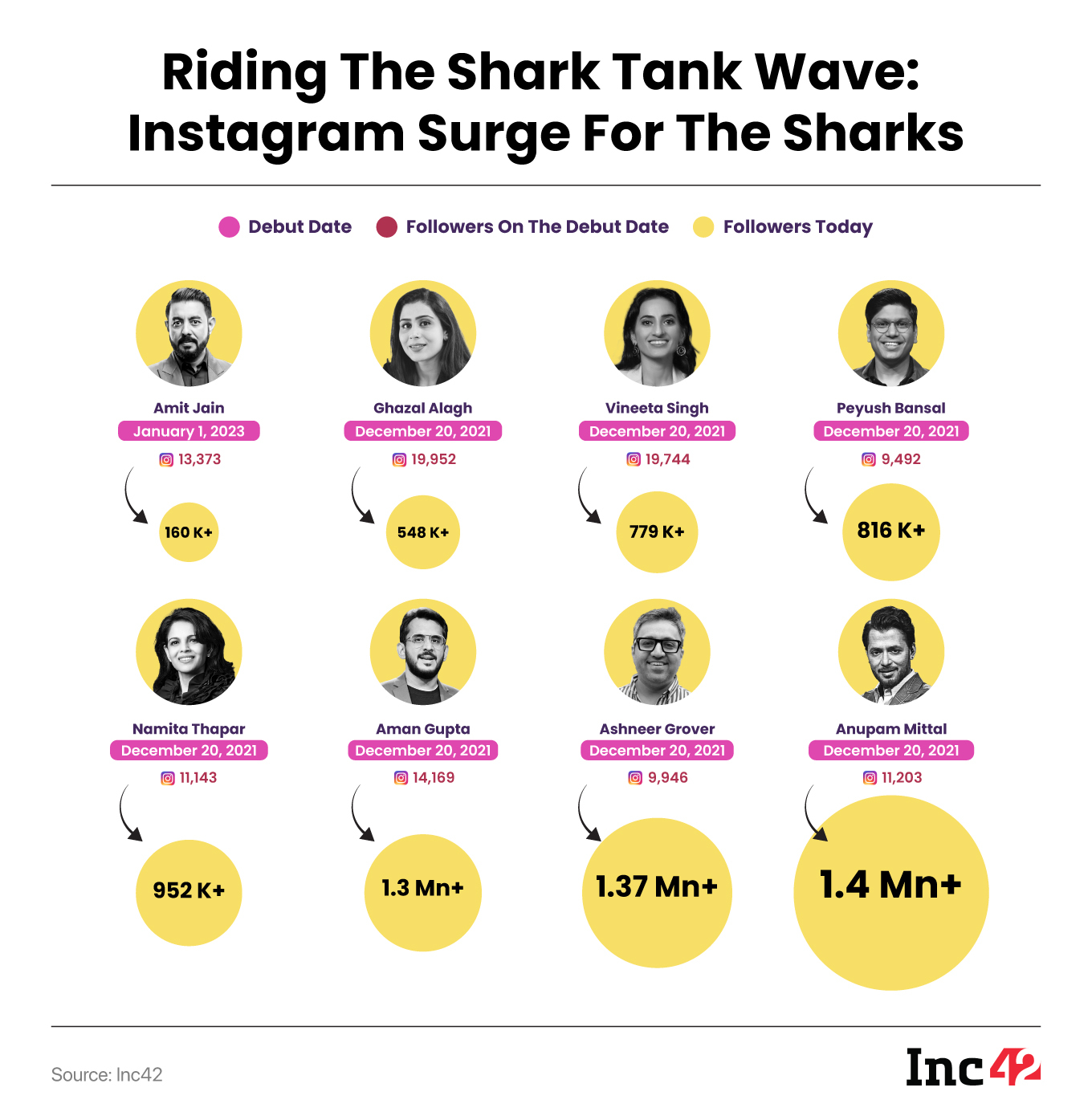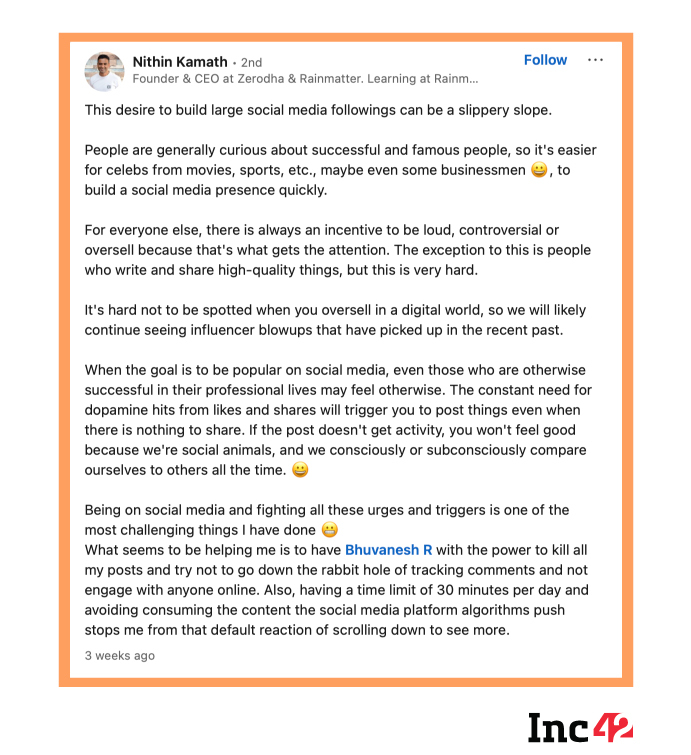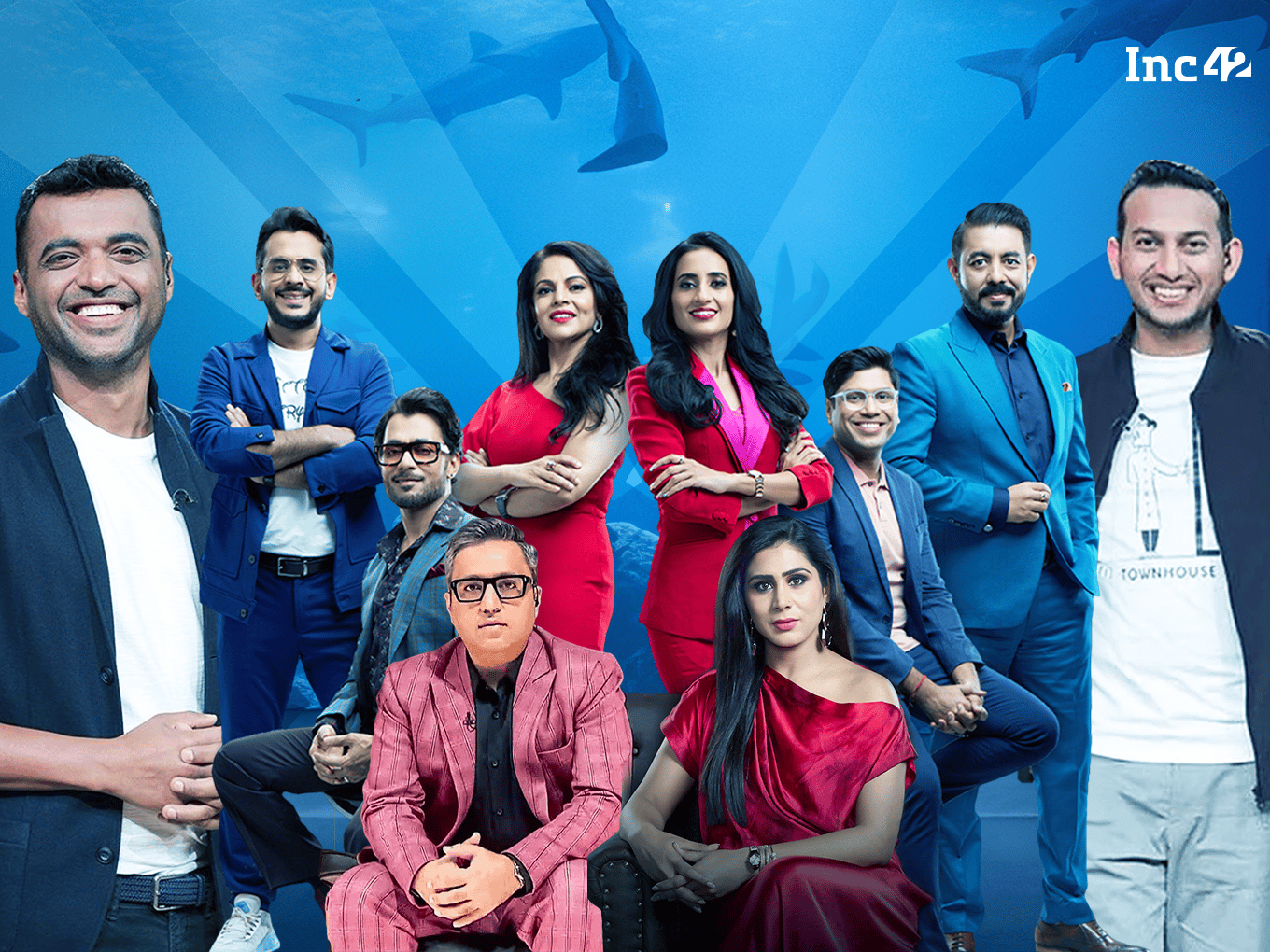A two-year-old business reality TV show Shark Tank India has given birth to the celebrity CEOs culture in India
An Inc42 analysis revealed a 68X average rise in Instagram followers of all Sharks
The Sharks are certainly cashing in on the newly found fame, but experts opine that businesses owned by Sharks cannot simply sustain on the stardom
Unlike its US doppelganger, the reality TV show “Shark Tank India” is quite young. Despite this, there is no dearth of people who religiously follow the Indian version of the ‘reality’ show.
Since its launch in December 2021, the show’s popularity has grown like wildfire. Not only has the desi version of “Shark Tank” become one of the topics of discussion at the Indian dinner table, but it has also made startups a household name.
Meanwhile, a key difference between the two shows (Indian and American) lies in the choice of judges. While the US version hosts judges who are industry veterans and corporate honchos, with decades of business experience under their belt, the Indian show is hosted by judges who are new-age entrepreneurs or have a diverse experience (though exceptions are there).
And, of course, the Indian judges are considerate enough not to throw water on each other, at least for now (pun intended). This abrupt mention comes against the backdrop of one of the episodes of the American version of the show in which Richard Branson, a British business tycoon, throws water at Mark Cuban, one of the richest Sharks on the show. And the duo laugh it off.
It is light-hearted shenanigans like these that changed the perception of the masses towards individuals in suits with flamboyant lifestyles and fancy businesses – from long-faced reserved businesspersons to a cheerful and sportive class of individuals, making them the names people could connect to and celebrate.
Now, this is where the most interesting element of the story lies.
The meteoric rise in popularity of the TV show didn’t just spotlight the judges, but their businesses too — with an invaluable surge in public attention across the vast Indian audience — a feat that typically demands a princely sum. And hence, more and more founders are joining the queue to get their share of fame.
A case in point is Aman Gupta of boAt, who is often seen stating that the show has helped him keep his marketing costs to a bare minimum.
Now that they have become public figures with their brands known to many, most Sharks (old or new) want to take their companies public, as seen in the case of MamaEarth and boAt (on hold for now). The same could be said about IPO-bound Ritesh Agarwal, one of the new Sharks in the 2023 edition.
Zomato CEO Deepinder Goyal is another interesting addition to the show in the upcoming season. The foodtech giant’s stocks have had a tumultuous ride on the stock exchanges, and Goyal’s addition will now be worth watching to see how it impacts his company’s share price and the business, as he connects with the masses through the show.
Interestingly, an Inc42 analysis reveals that the nine ‘Sharks’, who became the judges of Seasons 1 and 2 of the reality TV show, have seen a 68X rise (on average) in their Instagram followers ever since they began their Shark Tank journey.
But amid the dazzling lights of “Shark Tank India,” how will the Sharks navigate their sudden fame? Can their celebrity stature truly cement their ventures’ long-term success, or is it merely a fleeting spotlight? And in the era of relentless media scrutiny, will their actions off-screen amplify or undermine their brand’s reputation? The story unfolds.
Shark Tank India — A Stroke Of Luck?
Let’s take you back to when “Shark Tank India” aired its first episode in December 2021. Not to mention, it was also the time when new-age tech ventures were hot on the investor radar and therefore, flush with funds.
Call it a stroke of luck or a well-planned marketing strategy, seven Indian entrepreneurs appeared on season 1 of the reality TV show as judges.
These included BharatPe’s former MD and cofounder Ashneer Grover, boAt’s Aman Gupta, Anupam Mittal of Shaadi.com, MamaEarth’s Ghazal Alagh, Emcure’s executive director Namita Thapar, Peyush Bansal of Lenskart; and SUGAR’s Vineeta Singh.
Coming to the fore from different backgrounds, areas of expertise and business operations, there was but one thing in common among them — most of them are first-time entrepreneurs.
They soon became a sensation, captivating the country’s attention, as many aspiring entrepreneurs started envisioning themselves as the next Aman Gupta or Ashneer Grover of the Indian startup world.
While many Indians look up to the Ambanis and Tatas of the world as their ideals, the ‘Sharks’ have directly connected with Indian households, igniting the spirit of enterprise and the hope that they, too, could become the country’s top entrepreneurs.

The fan craze has been such that even the simplest of their dialogues started spreading like wildfire — “Hum bhi bana lenge” or “Yeh sab dogalapan hai”.
The stars of the Sharks shone brightly, and one of the judges, Aman, was even invited to the Cannes Film Festival, earning him global recognition.
However, this was quite unusual — nothing India Inc had ever seen before.
According to Kaustav Das, a digital marketeer and brand promoter, one would hardly find the CEOs of companies such as P&G India and HUL appearing on reality TV shows.
“You won’t see the executives helming the major listed companies dedicating time to TV shows. This is because they do not feel the need to do so. On the contrary, young startup CEOs crave to become popular, as they know that building a personal brand will bring along multiple benefits,” Das points out.
Pavan Padaki, a branding coach and the author of “Brand Vinci”, said, “On a personal level, it helps boost the CEO’s image, going beyond the corporate brand. Celebrity CEOs often seek professional help for self-promotion and to boost their media presence. A recent study indicated that celebrity CEOs receive increased pay, more opportunities to join boards, and protection from being fired. However, their firms do not enjoy similarly positive outcomes.”
Padaki is of the view that with multiple media channels at their disposal, many CEOs today are focussed on scoring high numbers of impressions, followers, likes, and shares, rather than what impact their brands or products have on the market.
Sharks’ Claim To Fame
If there is one thing that Indian startups are much known for is the amount of cash that these businesses spend on marketing and promotional activities. And, we have numerous examples to substantiate the erstwhile statement.
Despite being bogged down in heavy losses, startups such as BYJU’S, CRED, Unacademy, and MyGlamm, just to name a few, have, to date, burnt crores of rupees to become official sponsors at matches, fashion, lifestyle events and reality TV shows in a bid to get noticed in the cricket-crazy Indian market.
According to the Inc42 Financials Index, 210 unicorns and soonicorns spent a total of $2.7 Bn on advertising in FY22.
However, for ‘Sharks’, getting featured on the show was a bag full of image-building opportunities and a brilliant proposition to boost their revenues.
On a different note, however, several “Shark Tank” participants have time and again highlighted how their sales received a shot in the arm just by appearing on the show. If their statements are anything to go by, one can imagine the revenue boost that the ventures of the Sharks may have received.
Meanwhile, at Inc42, we did a comparative analysis of the Sharks’ Instagram followers ever since they started hosting the Indian reality TV show. Our study finds that the Sharks have received an unprecedented boost in the number of followers to date, with the names of their brands now known to a majority of TV viewers.
Let’s take the example of boAt’s CEO Aman Gupta, whose Instagram followers have jumped to over 1.3 Mn from a mere 14,169 followers when “Shark Tank India” made its debut in 2021.
Similarly, the outspoken ex-BharatPe managing director, Ashneer Grover, became a sensation after some of his clips went viral on social media platforms. Ever since he stopped appearing on the coveted TV show, Grover has been leveraging the power of social media by collaborating with influencers.
Interestingly, ahead of the launch of his book, Grover was seen using the word “Doglapan”, for a participant, who refused to join his side. The chapter from Grover’s short-lived stint at “Shark Tank India” and how his book became popular also point to the fact that the popularity of the brands helmed by the Sharks, too, may have received a majestic boost. Not to mention, “Doglapan” sold like hotcakes.

In an earlier interaction with Inc42, Grover said that he did not see social media fame as a bad thing at all, and how Shark Tank judges are particularly on the show because of fame.
The former BharatPe cofounder, who is famous for his bold statements, is now invited to college events, entrepreneurship/startup summits and celebrity talk shows.
Meanwhile, one of the calmest Sharks on the TV show, Anupam Mittal, today has more than 1.4 Mn Instagram followers. In December 2021, he had an Instagram follower base of only 11,203.
Women Sharks (Vineeta Singh, Namita Thapar and Ghazal Alagh), too, have not been behind in the race to the fame hill. The three women entrepreneurs’ Instagram followers today stand at over 779K, 952K and 548K, respectively. These business leaders also enjoy a huge engagement on the professional networking platform, LinkedIn.
In a way, the names of the Sharks have become synonymous with the companies they own and the brands they sell, but does this actually translate into effective sales generation and in turn profitability?
Personal Branding ≠ Product Branding?
A July 2021 research paper published on the London School of Economics website corroborates that while “celebrity CEOs” do enjoy many lucrative benefits of their status, it doesn’t necessarily translate into the soaring profits of the companies they head.
“Celebrity CEOs receive increased pay, more opportunities to join boards, and protection from dismissal. However, their firms do not enjoy similarly positive outcomes. In fact, celebrity CEOs often demonstrate higher levels of complacency, risk-taking, and hubris that result in negative performance repercussions for their firms,” the research states.
The marketing experts we spoke with are of the view that despite the celebrity status of the CEOs, the businesses they head will still rely majorly on the nature of the products or services their companies are offering.
Adding to the thought, another marketing veteran said that the popularity of the Sharks has little to do with the profitability of their respective companies.
“Even when it comes to the reach, we should understand that the audience tapped by the show, “Shark Tank India” is minuscule compared to the markets their businesses operate in. Unfortunately, marketeers today have found an easy way and have started solely relying on the TV and digital campaigns rather than running a brand health audit to understand the consumer acceptability and behaviour,” a marketing veteran, who did not wish to be named, said.
Das asserts that if the marketing campaigns and social media ratings simply translated to direct sales, the Sharks wouldn’t have to worry about swimming with losses at all.
The analyst was referring to the fact that a majority of the Sharks-owned businesses are grappling with losses. For example:
- Peyush Bansal-led Lenskart posted a consolidated loss of INR 102.3 Cr in FY22 against a profit of INR 28.9 Cr in FY21 as expenses surpassed revenue.
- Similarly, SUGAR Cosmetics’ FY22 loss jumped 255% To INR 75 Cr due to a sharp rise in expenses.
- Amit Jain-led CarDekho’s net loss stood at INR 246.4 Cr in FY22, down 28% from INR 342.8 Cr a year ago.
Though there are exceptions too. boAt has been a profitable venture, even though the brand’s profits dipped 20% in FY22. Similarly, MamaEarth posted its first-ever profits in FY22 with a standalone net profit of INR 19.8 Cr as against a net loss of INR 1,332.2 Cr in FY21.
The newest shark Deepinder Goyal’s foodtech venture Zomato posted its maiden profitable quarter with INR 2 Cr PAT in Q1 FY24. Similarly, Ritesh Agarwal’s OYO claims to be on track to report its first-ever profitable quarter in Q2 FY24. The travel tech startup has narrowed its FY23 loss by 38% YoY to INR 1,286 Cr on the back of a 14% rise in operating revenue, according to an internal email accessed by Inc42.
Celebrity Status Attained, But At What Cost?
In one of his social media posts, the CEO and cofounder of Zerodha, Nithin Kamath, highlights the downsides of embarking on the celebrity route.
Kamath specifically points out that the “desire to build large social media following can be a slippery slope”.

Meanwhile, an independent brand and marketing consultant, Saurabh Parmar, is of the view that the personal branding of business owners can have a positive impact to a point and then starts to gradually diminish.
“The impact of image building on your business will start to taper off after a point, while your celebrity status will keep rising. Being a Shark Tank judge will not increase sales. Eyeballs? Yes. But not real sales in the value-focussed Indian market. More people will notice the brand, but it is still not definite that they will buy the products just because the owner of a particular brand is now a public figure,” Parmar said.
While this is just one side of the story, one must also understand that ‘the bigger they are, the harder they fall’. According to marketing veterans, being a public figure leaves startup founders exposed to being judged, which could potentially harm their brands.
“Many may stop buying the products if they don’t like the judges or anything questionable done by them, even unintentionally,” Parmar highlighted.
Once you are popular beyond limits, anything you say on public forums or social media platforms could either be hailed or refuted with disgust.
Any thought put across and taken in a negative stead not only has the potential to damage the image of individuals but also their brands.
Last year, Peyush Bansal had to issue a public apology to the Chartered Accountant fraternity of India after his controversial remark on CAs during an episode of Shark Tank India.
Even questionable deeds done by founders who end up attaining celebrity status could make them lose credibility. We have seen this happening in the case of BharatPe’s Grover who has been fighting a long battle against the allegations of misappropriation of the company’s funds.
As of now, Indian Sharks have been able to maintain a good balance of their celebrity status by staying away from controversies. However, the largely free popularity has definitely put these startup entrepreneurs on a slippery slope, which likely demands them to be uptight and wary of what could spoil their image and therefore jeopardise their brand.
Here, the most imperative of all things will be the founders’ prudence to identify the dos and don’ts that come with celebrity status. The Sharks that will be able to strike the right balance between the two will likely enjoy a long-term positive impact on their brands. However, for this to happen, the show must go on.
[Edited by Shishir Parasher]
































 Ad-lite browsing experience
Ad-lite browsing experience